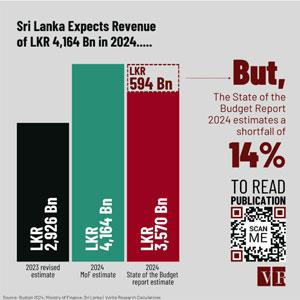According to the recently released ‘State of the Budget Report 2024’ compiled by Verité Research, Sri Lanka is projected to fall short of its revenue to GDP (gross domestic product) target for the 33rd consecutive year in 2024.
The State of the Budget Report, an annual publication by Verité Research, offers a comprehensive analysis of Sri Lanka’s fiscal, financial, and economic estimates. Published on PublicFinance.lk, the nation’s leading platform for economic insights, the report aims to facilitate informed engagement with the budget, both publicly and within parliament.
Verité Research’s State of the Budget Report has consistently provided more accurate budget outcomes compared to government projections approved by Parliament. It serves as a crucial additional resource for professional economic analysis and decision-making in Sri Lanka.
Sri Lanka has consistently overestimated tax revenue since 1991, failing to meet the revenue to GDP target set in the budget. In 2023, tax revenue fell short of the budgeted target by 13%, as reported by the Parliamentary Committee on Ways and Means.
For 2024, the government anticipates revenue of LKR 4,164 billion, a 42% increase from revised projections for 2023. However, the State of the Budget Report projects a 14% shortfall, estimating revenue of only LKR 3,570 billion.
The report attributes 61% of the projected shortfall to overestimation of revenue from the Value Added Tax (VAT), with the remaining 39% attributed to overestimation of revenue from corporate income tax, personal income tax, Social Security Contribution Levy (SSCL), and Customs import duty.
Sri Lanka holds the highest interest-cost-to-revenue ratio globally, and reducing this ratio is crucial for macroeconomic stability and sustainability. Although the 2024 budget aims to lower this ratio to 64%, projections from the State of the Budget Report, coupled with government calculations of interest costs, suggest that this ratio will exceed 70%, as it has in recent years.
The statement issued by Verité Research indicates that Sri Lanka will fall short of the economic recovery plan agreed upon with the IMF, particularly regarding a critical indicator of debt sustainability.
Source – dailymirror.lk












